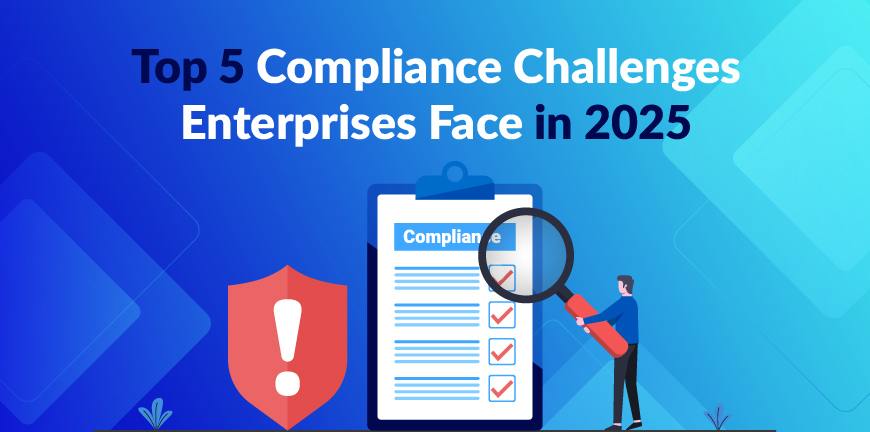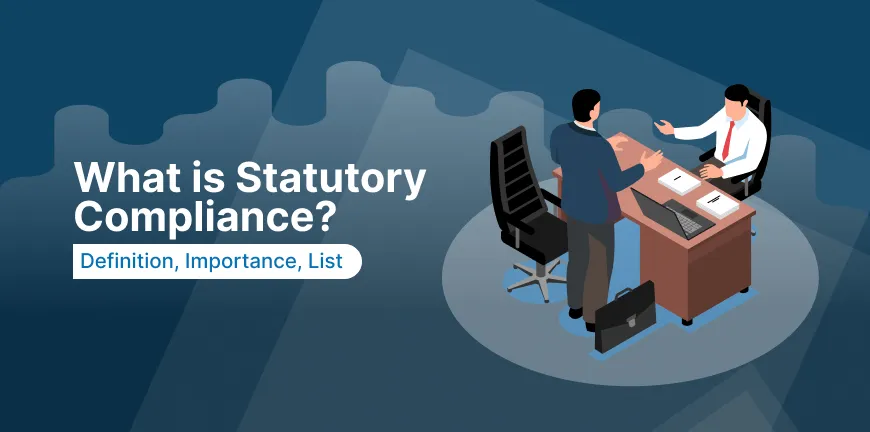
What Are Managed IT Services? Meaning, Types, Benefits and Challenges
08/07/2025
How to Hire a Graphic Designer: Complete Guide for 2025
08/07/2025Businesses across sectors in India must steer through a multifaceted regulatory web consisting of over 1500 acts & 69000 compliance requirements. This is just the tip of the iceberg, as companies must drive products and services in real time without diminishing quality, along with meeting compliance obligations year-round.
Although juggling through these responsibilities may sound overwhelming, a smart approach and dedicated efforts of integrating compliance with business operations will facilitate business growth & prevent non-compliance. Let’s dig deep and discuss the top 5 compliance challenges faced by enterprises in 2025 & proven strategies to overcome them.
What Are Compliance Challenges in 2025?
In India, compliance challenges are creating a catch 22 situation for companies of all sizes and sectors due to progressive regulatory reforms and large-scale technology integration to accelerate business operations. Additionally, the enforcement of the 4 new labour codes is making businesses rejig their payroll management systems, employee contracts, & statutory reporting to meet compliance requirements. Moreover, E-invoicing under GST continues expanding to smaller firms, requiring upgraded accounting and ERP systems to prevent severe penalties.
Data protection remains a top priority with the Digital Personal Data Protection Act mandating stricter security practices. These reforms are due to rising cyberattacks and unethical hacking. Additionally, aligning operations to ESG regulations has become non-negotiable, with SEBI requiring detailed disclosures on environmental & social impact, creating pressure on listed companies to direct their efforts and investment towards ESG compliance.
Rookie companies and SMEs are constantly tussling with regulatory compliance challenges. To align business operations with laws, they must adapt to evolving FEMA regulations for cross-border transactions and funding, failing to which can lead to severe penalties and, in extreme cases, business closure. Moreover, IT compliance challenges have reached a tipping point as ransomware attack cases have risen exponentially with more sophistication, & no sector is out of its radar.
Why is Compliance Important for Enterprises in 2025?
Here are 5 reasons that make overcoming compliance challenges crucial for enterprises in 2025:
1. Maintain Brand Reputation
A strong commitment towards maintaining 100% compliance will help businesses enhance their brand value. In the current digital realms where data breaches & cyberattacks have become rampant & nonchalant, compliance efforts act as a bargaining chip to combat them effectively.
2. Improved Customer Loyalty
Most large-scale surveys indicate that customers are willing to pay a premium for products and services if a company proves compliance from a 360 perspective. A strong focus on privacy, cybersecurity, & data protection can elevate a company’s status in the marketplace a few notches. A great example of this is the Apple company, which uses data privacy as its USP to gain customer loyalty.
3. Streamlines Business Operations
Embedding a compliance mindset with the business DNA can create more impetus that goes beyond just risk avoidance. This compliance-first approach helps companies optimise business operations at the core level, eliminate discrepancies, and promote a culture of accountability.
4. Attract & Retain Top Talent
In the current corporate arena, professionals at all levels value ethical practices & corporate responsibility in their workplace. Companies that overcome challenges in compliance and establish a transparent culture are more likely to attract & retain top talent across domains.
5. Drives Revenue
Revenue generation seems to be a neglected aspect that compliance can offer in the long run. A well-grafted compliance program can make companies stand out and attract new business avenues. Also, startups & SME that aspire to collaborate with big enterprises must prove compliance to take the next step towards securing a sustainable partnership. A company can stamp their authority through compliance and take its business to the next level,
What Are the Top Compliance Challenges Enterprises Face in 2025?
The 5 key challenges of compliance that companies need to win over to stay competitive and ensure continued growth.
1. Navigating through the Dynamic Regulatory Landscape
One of the most critical compliance challenges that enterprises are battling currently is bypassing the complex web of legal frameworks that gets more tangled across jurisdictions and sectors.
The companies that run businesses in sectors like healthcare, fintech, IT, etc., face constant scrutiny as they deal with sensitive data movement across their business operations. In order to operate for success and satisfy authorities, they must leave no stone unturned and monitor their every business step, keep workforce compliance trained, prepare audit-ready reports, & optimise every process to the bone, leaving no room for any complacency. The complexity is further aggravated by compliance demands that change shape across geographies, making it challenging for companies to expand their business horizon & maintain compliance at the same time.
2. Data Security and Management
As oxygen is a lifeline for our survival, data is the heart of the current business landscape that runs mostly on digital platforms. One of the most prioritised IT compliance challenges revolves around data security and management. As most business operations run on sensitive data, there are opposite forces that try to extract it unethically for wrong purposes.
Each industry follows online threat detection, arrest, and elimination protocols that are designed for the data type handled and storage setup (internal servers or cloud-based). However, the end goal is to protect data from various online threats through any means. Implementing security systems and practices that are air-tight involves a lot of investment and alignment with complex IT frameworks, making it challenging for companies to balance operational efficiency with compliance.
3. Proving Compliance
Even organisations might be fully compliant on paper, but proving it is a whole different story altogether. Sometimes, auditors may ask companies to provide proof of compliance with regulations that may be applicable or not, and companies may be short-handed in providing clear documentation, leading to legal repercussions.
4. Managing Third Parties
The growth tides in business are always fluctuating, and companies are looking for any edge to beat the competition. Therefore, most firms are forming symbiotic partnerships with third-party service providers to meet unquenched customer demands and accelerate delivery without affecting quality whatsoever. However, ensuring third-party compliance lies with the parent company, which is challenging since there will be reduced control and geographical limitations.
5. Striking a Balance between Compliance & Usability
One of the trickiest regulatory compliance challenges that companies sweat over is striking a balance between compliance and operational efficiency. Strict compliance measures can create hurdles and decelerate business operations, leading to delivery failure and reduced profitability.
How can Enterprises Overcome Compliance Challenges?
Here are some billable strategies to tackle compliance challenges in 2025:
1. Stay updated with the latest compliance regulations.
To troubleshoot regulatory compliance challenges, having the latest regulatory updates at the tip of your fingers is the only way out. A dedicated internal compliance team with cross-functional expertise must be formed to soak in and absorb the latest trends and regulation updates related to compliance and optimise operations in real time. This approach can get operations streamlined and maintain compliance, killing two birds with one stone.
2. Invest in Regular Compliance Training
Employee training is the unsung hero in combating key challenges of compliance. Companies must devote time and resources to ensure employees undergo regular training on internal policies, best compliance practices, and legal risks to prevent violations that can breach compliance boundaries.
3. Conduct Periodic Audits & Inspections
Audits are a crucial tool for dissecting compliance efforts. Periodic internal and external audits ( preferably every 3 months) performed by expert compliance audit agencies like ALP Consulting will help companies identify vulnerabilities at an early stage before they escalate to serious levels.
4. Foster a Culture of Accountability
Achieving compliance through individual efforts is just wishful thinking, not possible in reality. Companies must develop a culture of accountability to ensure every employee and manager follows compliance practices through self-motivation rather than external pressure. The management team must lead by example and showcase their commitment towards compliance.
5. Strengthen Data Protection Practices
Most business operations in the current age are data-driven, and protecting sensitive information is a vital aspect in fulfilling compliance requirements. Companies must align their security protocols and data management practices to regulatory frameworks such as GDPR and HIPAA. Additionally, employees must be trained on IT policies and practices to ensure data breaches, unauthorised access, and other violations are curbed at an early stage before they create a ruckus.
Frequently Asked Questions
1. What are compliance challenges?
Compliance challenges encompass adhering to complex, evolving laws, regulations, and standards related to data protection, labour laws, taxation, ESG reporting, and cybersecurity, often across multiple jurisdictions simultaneously.
2. Why is compliance important for enterprises in 2025?
Overcoming regulatory compliance challenges ensures legal operations, protects brand reputation, builds stakeholder trust, avoids penalties, and supports sustainable growth amid tightening regulations, technological disruptions, and increasing scrutiny from regulators and customers.
3. How can enterprises overcome compliance challenges?
Enterprises can combat challenges in compliancepayroll by investing in compliance management software, training employees regularly, engaging legal experts, conducting internal audits, automating reporting processes, and monitoring regulatory changes to stay proactive and prepared.
4. What are the penalties for non-compliance in 2025?
Penalties for non-compliance include heavy fines, business restrictions, legal action, director liability, loss of licenses, damaged reputation, and operational disruption. These outcomes can significantly threaten business continuity and financial stability.
5. Can AI help with compliance management?
Yes, AI automates regulatory monitoring, flags risk, manages documentation, ensures data accuracy, and improves efficiency, helping enterprises reduce manual errors and maintain compliance in real time.
Contact Us For Business Enquiry

Hariharan Iyer
Hariharan Iyer is the Vice President – Operations at ALP Consulting, bringing over 40+ years of experience in HR outsourcing and labour law compliance. He leads end-to-end HRO operations, ensuring process efficiency, statutory compliance, and seamless service delivery for clients across industries. With a strong background in labour law governance and workforce management, Hariharan plays a key role in driving operational excellence and compliance-led HR solutions at ALP Consulting.




